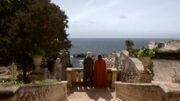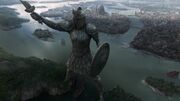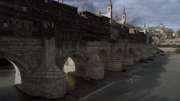 |
This page contains a considerable amount of unverified information. You can help the Wiki of Westeros by adding relevant references.
|
- This page is about the city-states. For the short, see: The Free Cities
- "Frankly, the nine of them are more alike than they would care to admit. They hire the same soldiers, to fight the same wars, for the same rulers... the rich, be they called Magisters, Archons, or what have you. When a Dothraki khalasar approaches, they give the same tribute to avoid the same sacking. For thousands of years, the disgraced of Westeros have rained east to pool in the Free Cities."
- ―Ser Jorah Mormont
The Free Cities[1] are nine powerful, independent city-states located across the Narrow Sea from Westeros. They occupy the western end of the massive continent of Essos, and are engaged in extensive trade contact with the Seven Kingdoms and lands further east. The overall range of the Free Cities and their respective territories is roughly equal in size to the lands of Westeros south of the Neck.
Each of the nine Free Cities has its own unique history and distinctive culture.
History[]
The Free Cities were founded centuries ago as colonies of the Valyrian Freehold. When the Freehold and its dragonlords were destroyed in the Doom of Valyria four hundred years ago, the empire fragmented, and a chaotic period of warfare known as the Century of Blood ensued. When the dust settled, the Free Cities emerged as autonomous entities, dominating much of the land between the river Rhoyne and the western coast of the continent.
Volantis is the oldest and most populous of the Free Cities, and for a time during the Century of Blood it tried to conquer and reunify the others, but eventually their rivals formed alliances and Volantis was subdued.[2] Originally, Volantis was also the most powerful of the Free Cities, and while still formidable, it was gradually eclipsed by the growing power of Braavos.
Braavos is very much the "odd-one-out" among the Free Cities, as it was not founded as a colony by the Valyrians, but as a refuge by escaped slaves who fled from Valyria. Also known as the "hidden city" - as its existence was kept secret for many years after its founding - Braavos was not devastated by the loss of central Valyrian control the way that the other eight Free Cities were, and after the dragonlords perished in the Doom, Braavos was happy to stop hiding its true power from the world. The city gradually increased in strength while the others were tearing themselves apart in civil wars, and in the present-day Braavos is now considered the most powerful of the Free Cities, with extensive control of the sea trade and large fleets of both merchant ships and war galleys - in contrast with how Volantis has the largest and strongest land armies. Most importantly, it is the home of the Iron Bank of Braavos, which has became the largest financial institution in the Known World, bigger than the banks of the other eight Free Cities put together.
In general, the Free Cities and have a much more urbanized and mercantile culture than Westeros: Each city controls large swaths of territory (often, not much smaller than one of the Seven Kingdoms), with most of them controlling towns larger than some Westerosi cities. Slavery is also practiced in most of the Free Cities - except for Braavos, which has strict laws banning the practice.
For centuries, it has been common for exiles from the losing sides of wars in Westeros to flee across the Narrow Sea to the Free Cities to seek refuge and fortune.
The nine Free Cities[]

A map showing the location of the nine Free Cities in the continent of Essos.

Pentos was the first of the nine Free Cities to appear on-screen in the TV series, at the beginning of Season 1. It reappeared at the beginning of Season 5.

Braavos was the second Free City to appear on-screen, first one brief appearance in Season 4, and then extensively featured throughout Season 5.

Volantis was the third Free City to appear on-screen, in Season 5's "High Sparrow".
- Braavos: the most powerful and northerly of the Free Cities, led by the Sealord. The city is scattered across numerous islands in a sheltered lagoon, connected by bridges and an extensive network of canals. It is home to the influential Iron Bank of Braavos and the secretive assassins' guild known as the Faceless Men. The city is noted for its formidable swordsmen , shipbuilding, religious tolerance and hatred of slavery.
- Lorath: considered the least-known and least-powerful Free City, located on an island southeast of Braavos, in the Shivering Sea.
- Lys: located on an island in the Summer Sea, close to the Stepstones and protected by a formidable navy. Lys is a city of vice, famed for its pleasure houses, which produce the most skilled prostitutes in the known world. Its people tend to be fair skinned, blonde haired, and blue eyed.
- Myr: a seaport on an arm of the Narrow Sea known as the Sea of Myrth. Noted for its skilled craftsmen and their products, particularly optical lenses and fine lace. Lys and Myr have been bitter rivals for centuries, perpetually fighting over the Disputed Lands between them. Its people tend to be dusky skinned and dark haired.
- Norvos: a major inland city, located on the Noyne River northeast of Pentos. It is situated in the hill country in the north of Essos, known as the Hills of Norvos. The Bearded Priests of Norvos rule over the city as a theocracy. Norvos is renowned for its axes.
- Pentos: a major seaport, land-based and vulnerable to Dothraki incursions from the continental interior. Among other items, it is frequently noted for its trade in cheeses. Nominally ruled by the Prince of Pentos, true power is held by a council of merchant magisters.
- Qohor: a major inland city, located in the immense Forest of Qohor near the edge of the Dothraki Sea, east of Norvos on the Qhoyne River. Noted for its immensely skilled blacksmiths, who can even reforge Valyrian steel. Qohor maintains a garrison of Unsullied warrior-eunuchs which it buys from Slaver's Bay to defend itself against the Dothraki.
- Tyrosh: a major seaport and mercantile city, ruled by the Archon. Tyroshi are known for extravagant clothes, flashy armor, and rich tastes. Tyrosh is located on an island close to the Stepstones, and is thus the Free City closest to Westeros. Due to its location between the Stepstones, Disputed Lands, and Westeros, it is often seen as a major hub for hiring the services of various professional sellsword companies, to serve in the various conflicts of these different regions.
- Volantis: the southeastern-most of the Free Cities and the largest, most populous and most corrupt, ruled by the triarchs of Volantis. Noted for its immense slave markets, wine and Valyrian traditions. Volantis was originally the most powerful of the Free Cities but its strength was sapped in the Century of Blood, leading to it being narrowly edged out by Braavos. Volantis is built on the main mouth of the immense Rhoyne River, with numerous tributaries of the Rhoyne forming a defensive barrier to the east that protects the city from the Dothraki. The major trade routes from Westeros and the rest of the Free Cities to lands farther east - such as Slaver's Bay, the Jade Sea, Qarth, and Asshai - all pass through Volantis.
In the books[]
In the A Song of Ice and Fire novels, the nine Free Cities occupy a large portion of western Essos. From north to south, they are Braavos, Lorath, Norvos, Qohor, Pentos, Myr, Tyrosh, Lys, and Volantis. Aside from Braavos, all of the Free Cities were founded as colonies of the mighty Valyrian Freehold, and gained their independence after the Doom of Valyria. George R.R. Martin has stated that the Freehold is essentially his fantasy world's equivalent of the Roman Empire, so the Free Cities would be his equivalent of the medieval Italian city-states which formed in the centuries following the empire's collapse. Lorath, Tyrosh, and Lys are located on islands off the coasts, while Norvos and Qohor are inland to the east. The rest are major seaports on the mainland. Since they cover a large area, the Free Cities actually have quite wide variations in climate: Myr, Tyrosh, Lys and Volantis possess warm, coastal climates similar to the Mediterranean, while Norvos and Qohor have continental climates more similar to France or Germany (though culturally, they are not even remotely similar to anything found in medieval Europe).
Officially, the term "Free City" refers to a system of government; the cities' founders purchased contracts from the Freehold to exercise semi-autonomous rule over their internal affairs, though the Valyrian dragonlords still set their external policies (such as the wars with the Rhoynar people). This is somewhat similar to the "free imperial cities" of the Holy Roman Empire in the real-life Middle Ages, with their own local governments answerable only to the German emperor. Because they already had a measure of self-governance, the Free Cities were able to survive the chaos following the Doom of Valyria more or less intact. In contrast, many direct colonies - which were totally dependent on Valyria itself - did not fair nearly as well. Only a few of these direct colonies in and around the Valyrian peninsula survived: Mantarys, Tolos, and Elyria.
Volantis was the first colony founded by the Valyrian Freehold in western Essos. Its citizens consider themselves the true heirs to the old empire and still carry on many of its traditions. Lys, Myr, and Tyrosh were established as mercantile centers; in these cities, trade is considered the most honorable profession, and personal wealth counts for more than birth or lineage. Lorath, Norvos, and Qohor were founded by religious dissidents who wanted to escape the widespread tolerance of the Freehold and practice their own beliefs without interference. Due to its central location, Pentos is something of a hybrid between the northern and southern Free Cities and shares qualities from both general groups.
Braavos in the far north was founded by a diverse group of slaves fleeing Valyrian tyranny. As a result, it technically wasn't a "Free City" in the sense that all the others were, but by tradition it simply gets lumped in with the rest. For this reason, Braavos is sometimes known as the "Bastard daughter of Valyria". In terms of size, Volantis is physically the largest city and the most populous, but Braavos is now the richest and most powerful. Volantis has the largest army, but Braavos has the largest navy and greatest financial power.
Lys and Myr are perpetual rivals, frequently warring over the Disputed Lands to the west of the River Rhoyne, as well as the Stepstones. Volantis and Tyrosh are sometimes reluctantly pulled into these wars. Volantis, at the mouth of the Rhoyne, is a major slave-trading center and a major stop for travelers heading from Westeros and the Free Cities to distant Slaver's Bay. The Rhoyne and its numerous tributaries form a substantial trade and transport link through the interior of the landmass.
According to the World of Ice and Fire sourcebook (2014), there was once an additional Free City, Essaria, located somewhere in the grasslands that formed the Kingdom of Sarnor. When the Dothraki rose up and destroyed the Sarnori city-states during the Century of Blood , Essaria was also razed, and was henceforth known as "the Lost Free City".
References[]
- ↑ Game of Thrones: Season 1, Episode 7: "You Win or You Die" (2011).
- ↑ "The Free Cities"
External links[]
| Westeros |
Beyond the Wall (Land of Always Winter) · Crownlands · Dorne · Gift · Iron Islands · North · Reach · Riverlands · Stormlands · Vale of Arryn · Westerlands |
| Essos |
Bone Mountains · Dothraki Sea · Footprint · Free Cities (Andalos · Axe · Braavosian Coastlands · Disputed Lands · Forest of Qohor · Golden Fields · Hills of Norvos · Orange Shore · Stepstones) · Ghiscar · Hyrkoon · Leng · Lhazar · Red Waste · Sarnor · Shadow Lands · Slaver's Bay · Valyrian peninsula · Yi Ti |
| Sothoryos | |
| Other |
Great Moraq · Ibben (Ib) · Summer Isles · Ulthos |
Free Cities | |
|---|---|
| Cities |
Braavos · Lorath · Lys · Myr · Norvos · Qohor · Pentos · Tyrosh · Volantis (Selhorys · Valysar · Volon Therys) |
| Ruined Rhoynar cities |
Ar Noy · Chroyane · Ghoyan Drohe · Ny Sar · Sar Mell |
| Border regions | |
| Regions and geography |
Andalos · Axe · Braavosian Coastlands · Flatlands · Forest of Qohor · Golden Fields · Hills of Norvos · Orange Shore |
| Seas |
Lorath Bay · Narrow Sea · Sea of Myrth · Shivering Sea · Summer Sea |
| Rivers and lakes |
Dagger Lake · Rhoyne · Qhoyne |
| Culture |
Archon · Bakkalon · Bravo · Cyvasse · Faceless Men · Freedmen · High Valyrian · Hooded Wayfarer · Iron Bank of Braavos · Lord of Light · Low Valyrian · Magister · Mercenary · Merling King · Moon-Pale Maiden · Pleasure house · Prostitution · Red priest · Slavery · Stone Men · Weeping Lady |
